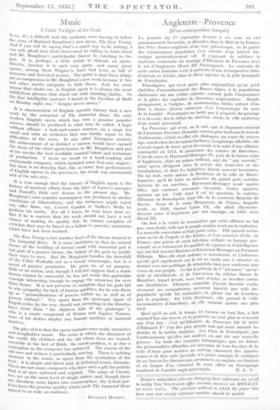Music
A Celtic Twilight of the Gods
Scar:, it's a difficult task the audience were having to follow the story of Rutland Boughton's new opera, The Ever Young. And if you will be saying that's a queer way to be writing, I can only plead that Irish blood must be calling to Irish blood and Mr. Boughton's participular disease be catching to the Pen. It is, :perhaps, .a little unfair to ridicule an opera- libretto, because it is such easy game, and many great .operas, among them Wagner's, have had texts as full of nonsense and distorted syntax. The point is that these things are.so conspicuous in Mr. Boughton's new work because it has not other merits adequate to hide them. And, for sonic reason that eludes me, in English opera it is always the most infelicitous phrases that stand out with startling clarify. So the first intelligible sentence I heard in the Pavilion at Bath on Monday.night was " Aengus never snores."
It is characteristic of English operatic history that a new Work by the composer of The Immortal Hour, the only modern English opera which has won a genuine popular ,success, should be produced in what may be called—I hope without offence—a hole-and-corner manner, on a stage too small and with an orchestra that was hardly equal to the difficulties of the score. In any other European country the achievement of so distinct a success would have opened the doors of the chief opera-houses to Mr. Boughton and put at, his service the best available musical talent and technique of production. I mean no insult to a hard-working and enthusiastic. company, which included some first-rate singers ; but there is no denying that, like so many first performances of English. operas in the provinces, the result was amateurish and of the arts arty.
It is true of English opera is the rue enough that the history
history of amateur efforts from the days 'of Lawes's masques and Purcell's Dido and .Aeneas to the present day. Mr. Boughton's 'ownpopular masterpiece was produced in similar conditions. at Glastonbury, and the composer might reject anY offer from, say, Covent Garden or Sadler's Wells to Perform his works. For all I know, he may have done so. Ent if he is Content that 'his work should not have a real 'chance of making its quality felt, he cannot complain of criticism that may be based on a failure to perceive intentions which have not been realised.
The lever. Young is but another facet of the theme treated in The Immortal flour. It is more ambitious in that its central thenic of the wedding of mortal maid with immortal god is their Part a a greater theme, the failure of the gods to justify Pick •WayS to men. But Mr. Boughton handles the downfall Of the 'Celtic' Walhalla not as a heroic catastrophe, but in a mood of riasid_ve __
little or no pessimism. He gives us, of set purpose, action, and, though I will not suggest that a static drama Cannot' be successful, he has not made this particular example interesting enough to engage the attention for over three hairs. It is not perverse to complain that his gods fail win sympathy for lack of human
to qualities, for he sets them up as 'Personifications of powers within us, as well as Of Powers withaut." Yet, apart from the grotesque figure of tiagola (who, by the way, should not, according to the libretto, have ' more than " the slightest hint of the grotesque "), who is a comic compound of Wotan and Jupiter Tonans, none of hisqualities or national
deities display any human motives.
The pity, of it is that the opera contains some really attractive and imaginative music. The scene in which the dreamers of the world, the children and the old whose lives are wasted, assemble at the feet of Bride, the moon-goddess, is as fine a conception as the composer has achieved.. The chorus of the 'old men and women is particularly moving. There is nothing abstruse in the music, as apart from the symbolism of the
it
text ; technical terms, diatonic.
is .te , simple and direct and, in ch
There are not many composers who have such a gift for melody that is, at once unforced and original. The songs of Caexia, too, are, on the same level of ,simple chaTtn, and, though there are elsewhere some lapses into commonplace, the lyrical por- tions have the genuine quality which made The Immortal Hour ,appeal to so wide an audience..
DYNELEY HUSSEY.






































 Previous page
Previous page